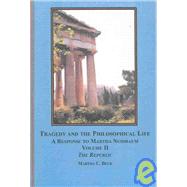| Preface: Dr. Mark Moes | i | ||||
| Foreword: Dr. Patrick Henry | v | ||||
| Acknowledgements | vii | ||||
| I. Introduction | 1 | (4) | |||
| II. Nussbaurn's Position | 5 | (4) | |||
|
5 | (1) | |||
|
5 | (2) | |||
|
7 | (2) | |||
| III. Response to Nussbaum #1: Plato's View Did not Change, or Change as Radically, as Nussbaum Claims | 9 | (8) | |||
|
9 | (1) | |||
|
10 | (1) | |||
|
10 | (7) | |||
| IV. Response to Nussbaum #2: Plato is not Anti-tragic | 17 | (14) | |||
|
17 | (1) | |||
|
18 | (8) | |||
|
18 | (5) | |||
|
23 | (3) | |||
|
26 | (5) | |||
| V. Tragedy in the Republic, Book I | 31 | (52) | |||
|
31 | (14) | |||
|
33 | (3) | |||
|
36 | (6) | |||
|
42 | (1) | |||
|
43 | (2) | |||
|
45 | (3) | |||
|
48 | (26) | |||
|
48 | (9) | |||
|
48 | (4) | |||
|
52 | (2) | |||
|
54 | (3) | |||
|
57 | (6) | |||
|
57 | (1) | |||
|
57 | (4) | |||
|
61 | (2) | |||
|
63 | (11) | |||
|
63 | (5) | |||
|
68 | (2) | |||
|
70 | (4) | |||
|
74 | (9) | |||
|
74 | (2) | |||
|
76 | (1) | |||
|
77 | (1) | |||
|
78 | (5) | |||
| VI. The Low Road: Books II-V and VIII-IX | 83 | (22) | |||
|
83 | (10) | |||
|
84 | (2) | |||
|
86 | (2) | |||
|
88 | (4) | |||
|
92 | (1) | |||
|
93 | (7) | |||
|
93 | (1) | |||
|
94 | (3) | |||
|
97 | (3) | |||
|
100 | (5) | |||
| VII. Response to Nussbaum #3: Plato Goes Beyond Tragedy Books VI and VII: The High Road within the City | 105 | (14) | |||
|
105 | (2) | |||
|
107 | (2) | |||
|
109 | (4) | |||
|
113 | (6) | |||
| VIII. Socrates as the Philosophical Ruler/Educator | 119 | (22) | |||
|
119 | (2) | |||
|
121 | (1) | |||
|
121 | (3) | |||
|
124 | (3) | |||
|
127 | (4) | |||
|
131 | (2) | |||
|
133 | (3) | |||
|
136 | (2) | |||
|
138 | (3) | |||
| IX. The Discussion of Homer in the Republic: Socrates' Effort to Reeducate the Youth | 141 | (24) | |||
|
143 | (5) | |||
|
143 | (2) | |||
|
145 | (3) | |||
|
148 | (1) | |||
|
149 | (3) | |||
|
152 | (2) | |||
|
152 | (1) | |||
|
153 | (1) | |||
|
154 | (2) | |||
|
156 | (9) | |||
|
156 | (1) | |||
|
157 | (1) | |||
|
158 | (1) | |||
|
159 | (1) | |||
|
160 | (1) | |||
|
160 | (2) | |||
|
162 | (3) | |||
| X. Socrates' Creation of Rational Art | 165 | (8) | |||
|
165 | (1) | |||
|
166 | (7) | |||
|
167 | (2) | |||
|
169 | (1) | |||
|
169 | (2) | |||
|
171 | (2) | |||
| XI. Socrates as the Philosophical Ruler throughout the Republic | 173 | (14) | |||
|
173 | (1) | |||
|
173 | (3) | |||
|
176 | (5) | |||
|
181 | (2) | |||
|
183 | (4) | |||
| XII. Response to Nussbaum. "The Republic:" True Value and the Standpoint of Perfection | 187 | (26) | |||
|
187 | (3) | |||
|
190 | (4) | |||
|
194 | (3) | |||
|
197 | (4) | |||
|
201 | (4) | |||
|
205 | (3) | |||
|
208 | (1) | |||
|
209 | (4) | |||
| XIII. Conclusion: Martha versus Martha | 213 | (2) | |||
| XIV. Epilogue: Teaching Plato's Republic in 2004 in the Republic of the United States of America | 215 | (20) | |||
|
217 | (9) | |||
|
217 | (1) | |||
|
218 | (1) | |||
|
219 | (2) | |||
|
221 | (1) | |||
|
222 | (1) | |||
|
223 | (1) | |||
|
224 | (2) | |||
|
226 | (2) | |||
|
228 | (3) | |||
|
231 | (4) | |||
| Bibliography | 235 | (16) | |||
| General Index | 251 | (2) | |||
| Index of Passages | 253 |








